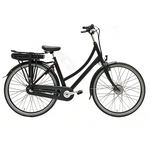 |
| Image skimmed from Plain Bicycle’s e-shop. Don’t you wish you had one of these? Wouldn’t a nice government rebate help? |
Dear Minister Jagmeet Singh
I saw your online petition regarding tariffs on Teslas – and I agree and all – but as for the $10,000 rebate for buying a Canadian-made EV instead (does such a thing even exist?), can I suggest something that would have a far greater impact on reducing Canada’s transportation emissions?
A cash rebate on the purchase of an ebike.
Maybe something like $2,000 on the purchase of an ebike; $3,000 on a
cargo bike. The numbers may not be quite right. Maybe they’re a little low. Maybe they’re a little high. You have people who can figure out the correct amount.
But the point is, for a much lower dollar amount that you are giving away on EVs, you could have a much bigger impact on greenhouse gases.
EVs still do tremendous road damage and cause tire shed – more than ICEs mostly likely due to their greater weight.
EVs still clog the roads with the equivalent of a couch, two easy chairs, large storage chest, stereo system and large engine, usually just to move one person.
The biggest thing is that even a $10,000 rebate isn’t a big enough reduction on the final price to actually change anyone's decision to buy an EV. It’s a reward for those who already decided, but it doesn’t lead change.
A much smaller rebate (as suggested above) on an ebike, however, is half or more than the cost of the bike. That’s transformative now because it makes an ebike affordable. It's priced just low enough to take a risk on. And I feel certain that almost every ebike owner will tell you it has transformed getting around for them.
Now that the “effort” quotient is taken out of cycling, so have many
of the excuses not to ride: too far? Not anymore. Too sweaty? Use more
boost. Too tired? Let the bike do most of the work for you. Too much
stuff to haul? e-cargo bike makes it easy and possible.
As long as hostile, antagonist drivers don’t menace your personal safety, biking is a far more pleasant way to get around than driving – as folks would realize if they would just try it.
The climate crisis is too close and coming too fast to keep dithering with partial measures and trying to motivate tiny tweaks to personal choices in transportation, when what we need is significant mode shift, not from one type of personal vehicle to another, but from personal vehicles to multimodal means ranging from walking to biking to skating to bussing to carpooling and other ride-sharing options – and often a combination of several depending on the needs of the trip.
Be visionary. Subside real change.
Sincerely
A year round commuter cyclist from Winnipeg who knows the only things
keeping one from cycling are poor infrastructure and a bad attitude.
Updated: 17 March 2025: typos corrected and ideas clarified.
Comments